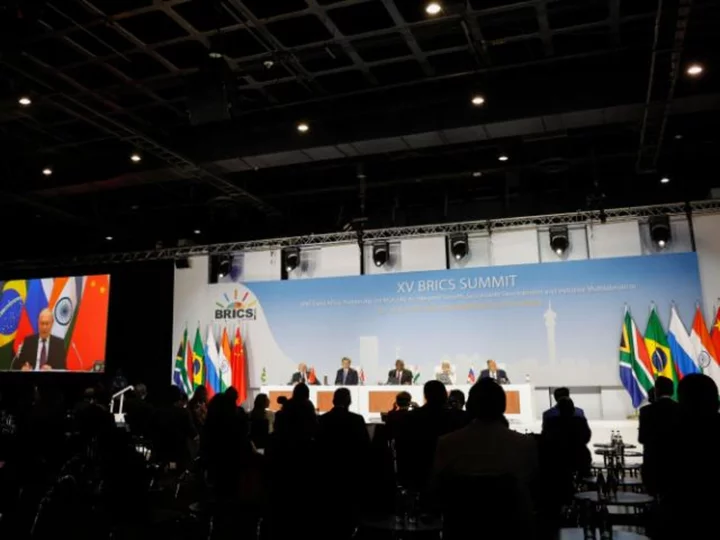Oil powers Saudi Arabia and the United Arab Emirates have been invited to become members of the BRICS group of developing nations in its first expansion in over a decade.
Also invited are Iran, Egypt, Ethiopia and Argentina, South African President Cyril Ramaphosa said Thursday as he wrapped up the annual summit of the group in Johannesburg.
Saudi Foreign Minister Prince Faisal bin Farhan said the kingdom was awaiting details from the BRICS group on the nature of the membership, and would take an "appropriate decision" accordingly.
All six countries invited had already expressed an interest in joining. The BRICS group currently includes Brazil, Russia, India, China and South Africa.
"The membership will take effect from the first of January, 2024," Ramaphosa said.
In a video message, Russian President Vladimir Putin congratulated the new BRICS members, adding that the bloc's global influence would continue to grow.
"I would like to congratulate the new members who will work in a full-scale format next year," Putin said.
"And I would like to assure all our colleagues that we will continue the work that we started today on expanding the influence of BRICS in the world," the Russian president added.
China's President Xi Jinping called the bloc's expansion "historic," reflecting its determination to "unite and cooperate with developing countries."
"[It will] inject new impetus into the BRICS cooperation mechanism and further strengthen the power of world peace and development," Jinping said.
Indian Prime Minister Narendra Modi also welcomed the expansion, saying his country had always believed that adding new members would strengthen the bloc.
Speaking to Saudi TV channel Al Arabiya, the Saudi foreign minister added that the bloc had "proven itself to be a useful and important channel to strengthen economic cooperation with countries of the so-called Global South."
Bin Farhan told the BRICS conference earlier Thursday that the kingdom would continue to be a "secure and reliable energy provider," adding that total bilateral trade between Saudi Arabia and BRICS nations exceeded $160 billion in 2022.
An anti-Western bloc?
If Saudi Arabia accepts the invitation, the world's largest crude oil exporter will find itself in the same economic bloc as the world's biggest oil importer, China.
It will also mean that Russia and Saudi Arabia — both members of OPEC+, a group of major oil producers — will join each other in a new economic bloc. The two countries often coordinate their oil output, which has in the past put Saudi Arabia at odds with its ally, the United States.
The bloc's expansion raises the question of potential de-dollarization, a process by which members would gradually switch to using currencies other than the US dollar to conduct trade. The BRICS countries have also been talking about a common currency, an idea analysts have described as unworkable and "unlikely" in the near future.
Putin said the issue of a common currency was a "difficult question" but added "we will move towards solving these problems."
The expansion takes place at a time when some BRICS members, namely Russia and China, are locked into rising tensions with the West.
Experts have said that choosing to include countries that are openly antagonistic toward the West, such as Iran, could swing the group further toward becoming an anti-Western bloc.
Built off a term originally coined by former Goldman Sachs economist Jim O'Neill to describe key emerging markets, the group has persisted despite deep differences in political and economic systems among its members.
"Economically, not many of the countries that are applying to join are particularly large," O'Neill told Bloomberg earlier this week.
Existing BRICS members have "had enough difficulty trying to agree just between the five of them," he added. "So beyond the admittedly hugely powerful symbolism, I'm not quite sure what having a lot more countries in there is going to achieve."
BRICS held its first summit in 2009 with four members and then added South Africa the following year. It launched its New Development Bank in 2015.
The United Arab Emirates President Mohamed bin Zayed al Nahyan said on X, formerly Twitter: "We appreciate the inclusion of the UAE as a member to this important group."
Egyptian President Abdel Fattah el-Sisi said his country looked forward to joining BRICS in order to strengthen economic cooperation among its members, as well as "raise the voice of the Global South," according to the presidential spokesperson.
— Manveena Suri, Mostafa Salem, Lizzy Yee, Mengchen Zhang and Nadeen Ebrahim contributed to this article.

